‘We played to 10 people for eight years’: The Offspring, punk-rock icons, are back
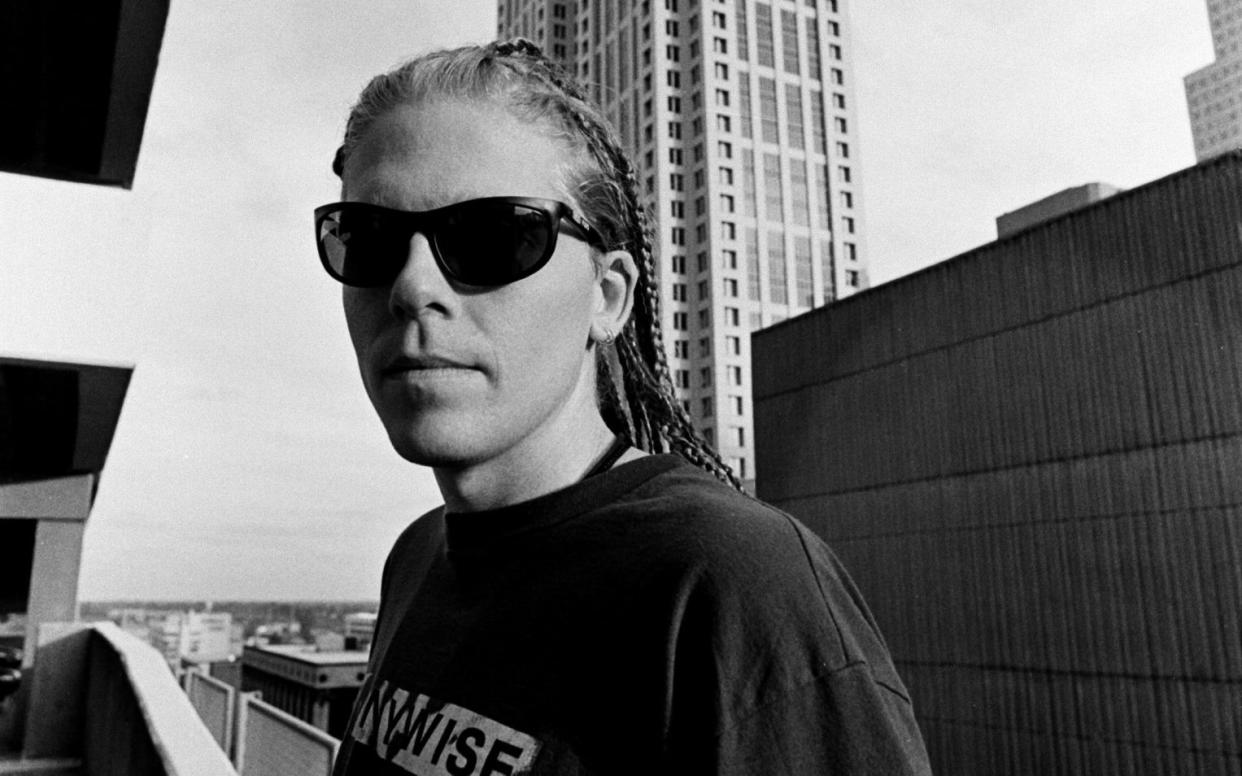
- Oops!Something went wrong.Please try again later.
Dexter Holland, the singer and guitarist with The Offspring, flies planes. As a member of the Angel Flight charity, in his free time he takes gravely ill people from their homes in the boondocks of the south-western states of America to hospital appointments in and around Los Angeles. Sometimes the patients can’t afford their own airfare. Requiring chemotherapy or dialysis, often they’re too weak to endure a 12-hour ride in a car.
In the age of Covid, aboard his eight-seat Cessnar Citation he flew a young man from LA back to his home in San Luis Obispo, in California. Walking with the aid of crutches, this latest passenger was wearing a black T-shirt bearing the name of an extreme metal band. The singer can’t remember exactly which one; he hazards a guess at Cannibal Corpse.
“I thought, this guy, if he hasn’t figured it out already, he’s going to figure it out soon,” Holland tells me. “He was nice. I didn’t really talk to him on the flight because I was up front flying the plane and wearing masks and all that stuff. But then we drop him off and walk him inside and he leans over and says, ‘By the way, I know who you are. I just wanted to say that’s so cool that you flew me.’”
With their singer at the controls, The Offspring are the only punk rock band in the world who tour by private jet. As well as this, they have to their name the highest-selling independent rock record of all time; released in 1994, the appropriately titled Smash made its way into the homes of 11 million listeners. Four years later, on a major label the Americana LP fared even better. In the UK, its leadoff single, the deftly satirical Pretty Fly For A White Guy, made it to number one.
After almost a decade in the wilderness, at last they’re back. Released this month, Let The Bad Times Roll, the band’s 10th album, successfully mines seams that The Offspring have long made their own. A superior creation, with many a melodic splash, its 11 tracks will likely lock step with anyone who likes their music to be buoyant and bold, and sometimes fast. A collection of witty and often socially conscious lyrics are included in the price.
“It felt right to be writing these songs that talk about what’s going on right now,” says Holland. “The time was right for this record. The social upheaval of the past year has been incredible. There’s a lot of crazy politics going on. There’s definitely been things going on in the US that feel very America-centric to us. But we see it going on around the world too – in Hong Kong, for example, and Myanmar.”
“There’s a lack of sex, too,” says Kevin “Noodles” Wasserman, the group’s main guitarist. “People are just not having as much sex as they were.”
Dexter Holland confirms his agreement with a sagacious nod. “It’s the unspoken pandemic,” he says.
As spring struggles to get out bed, the pair are staring at me from a recording studio near their homes in Orange County. Doubtless it’s been spring there since the middle of December. Friends for almost 40-years, the two fifty-somethings have long since fallen into habit of joining in which each other’s answers. To my delight, they still look like punks. Dexter Holland’s spiky hair is platinum blonde. Sprouting wild above Elvis Costello glasses, Noodles’ black and white number appears to have been fashioned by someone who was trying to give up smoking.
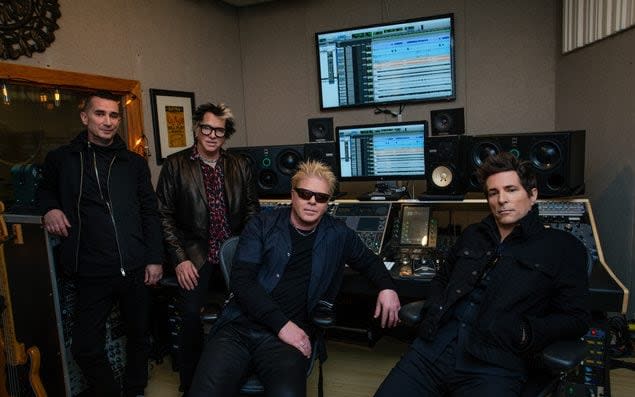
They formed entirely by accident. Unable to gain entry to a sold-out Social Distortion concert at Fender’s Ballroom, in Long Beach, that very night Dexter Holland decided to start a band. Originally called Manic Subsidal, in true punk style none of the original participants had ever played an instrument. The following year, in 1985 Noodles joined the group. He could play guitar; just as importantly, he was old enough to buy beer. Twelve months later, they became The Offspring.
“We taught ourselves to write songs quickly,” says Holland, “in 10 years.”
Like every other punk rock group of the time, this one did not expect to become famous. Even the thought of their music earning them a modest living was unimaginable. In Southern California, the clubs were clogged with hairspray metal. For the most part unable to get established gigs, instead The Offspring played veterans’ halls and backyard parties. They toured in a car. Drawing a halfway decent crowd meant an eight-hour drive to the small punk venues of the Bay Area.
“I’d read about bands that got really big – Human League or U2, even – and they’d say, ‘Yeah, when we first started there were 10 people at our shows,’” says Holland. “Right? Well, we had 10 people for, like, eight years. I might be exaggerating a little bit, but it was no more than 30… we played a hometown show the week before Smash came out and we drew 100 people. Seriously, 100 people was the best we could do.”
When it at last arrived, the group regarded success as an imposter. With Smash catapulting its way up the charts, Noodles continued to work as a janitor at a junior school near Disneyland. Watching as he raked leaves, some of the kids at the Earl Warren High School next door would tell him that they’d seen him on MTV only that morning. “What the hell are you doing?” they’d ask. To this day, “retired janitor” are the first words on his Twitter profile.
“After a few years I think we did have a discussion about trying to make some money and living off [our music] for a while,” he says. “But I think I was probably too afraid to leave my job. I had health benefits. I had a retirement account.”
Meanwhile, Dexter Holland was a student at the University of Southern California. Driving to classes through the then-blighted neighbourhoods of Watts and Compton, he had an idea for a song about gang violence. The leadoff single from Smash, Come Out and Play’s extraordinary success curtailed its author’s plans for an academic career as a molecular biologist. Such was the song’s popularity that the college’s brass band took to playing it in front of 90,000 people at USC Trojans American football games at the LA Coliseum.
— The Offspring (@offspring) April 22, 2021
Earning his doctorate in 2017, Dexter Holland’s published PhD paper – Identification of Human MicroRNA-Like Sequences Embedded within the Protein-Encoding Genes of the Human Immunodeficiency Virus – includes such page-turning nuggets as, “Both full-length cellular miRNAs (hsa-miR-424 and hsa-miR-30d) exhibited 76%–100% homology domains within the gag-pol regions of four isolates from three HIV-1 strains.” In at last completing his studies, he joined Milo Auckerman, from the Descendents, and Greg Graffin, from Bad Religion, as one of three Californian punk singers with a doctorate in science.
“We were trying to think, rock versus punk-rock [doctors],” says Noodles. (The nickname, by the way, was given to him by a record producer frustrated by his habit of noodling on his guitar whenever he messed up a take.) “Rock has Brian May, of course, but punk rock has three. So punk rock’s better than rock.”
You’d think so, wouldn’t you. Nine months after putting my name to an article in which I predicted the scene was dying, in 1994 the genre broke into the American mainstream for the first time. Green Day struck platinum on Warner Bros; better yet, The Offspring did so on an independent label (Epitaph) that until that point had enjoyed only modest success. Believing that none of its signatories would ever earn a gold disc, instead owner Brett Gurewitz threw ice cream parties for bands who had shifted one tenth of the number required. Fifty thousand units, he reasoned, was “punk rock gold”.
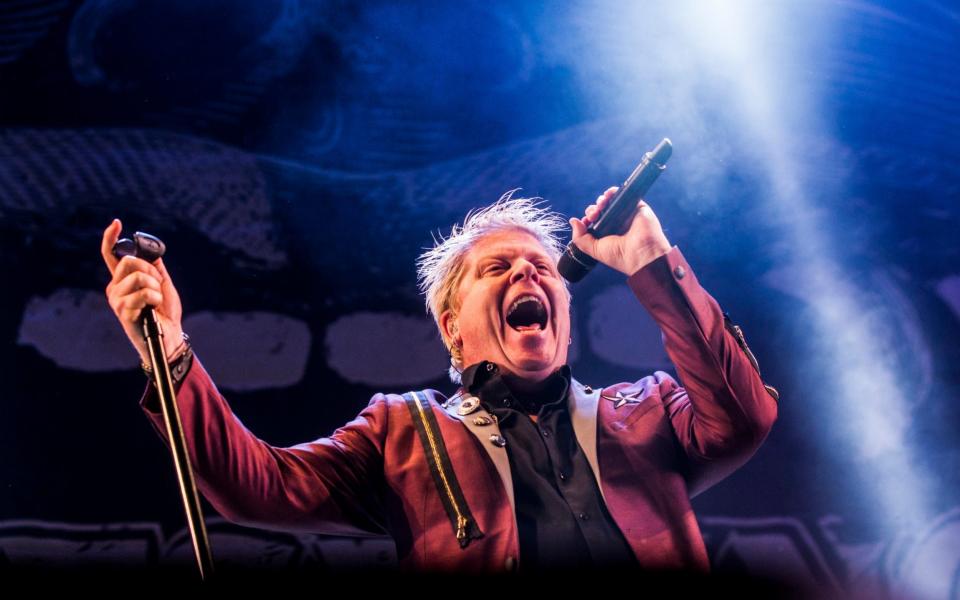
In its year of release, Smash went triple platinum in the United States alone. In order to pay to have the album pressed in sufficient quantities, Gurewitz remortgaged his home. At the label’s office on Santa Monica Boulevard, copies were stacked from floor to ceiling; they were on the pavement outside, too. In a centerspread advert in the trade paper Billboard, the company’s small staff (literally) flipped the bird to the rest of the music industry. Epitaph was founded with a loan of a thousand bucks. When Sony offered $50million for a 49 per cent stake, Gurewitz declined.
“We took on the Goliaths of the world as an independent act,” says Noodles. “And that is something we were proud of then, and we’re proud of it now.”
“Talk about a complete change of life,” says Holland. “Within three months, we’d gone from what we were to being a full time punk rock group, or rock’n’roll band. It was a rollercoaster… [by then] we’d been doing the band for a long time, and that was an advantage for us. If it had all happened within a year [of forming] it would have been different. I think we were able to weather it a little bit better. We were able to keep our expectations low because we’d had so much failure.”
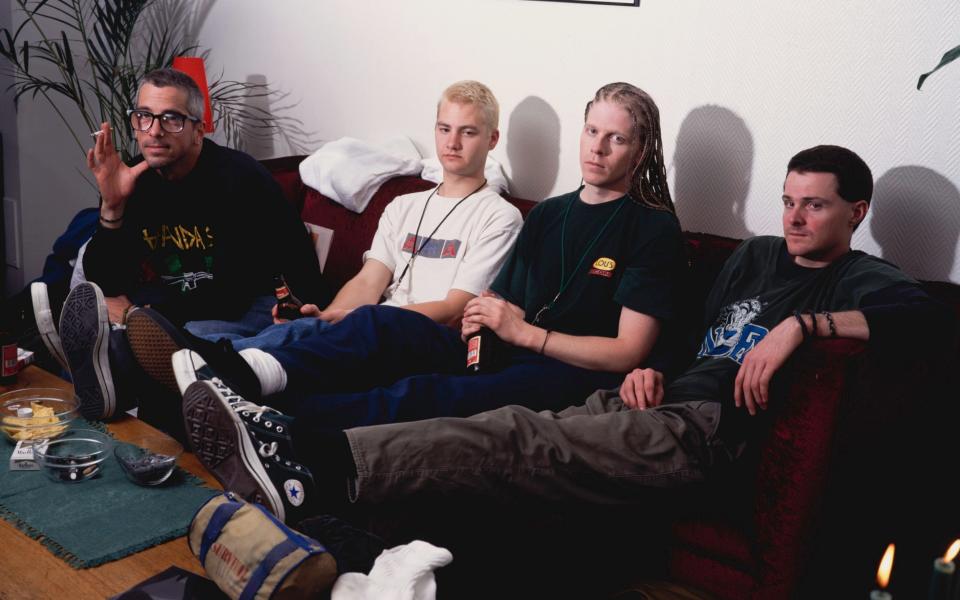
As we wait for the two musicians to stop laughing, I’ll tell you this. Witnessing the event in real time, I believed that a part-time band cracking the mainstream without the help of corporate muscle was the blood and guts of the story. But there was more to it than this. In dangerous times, as the body count of the 1990s’ Alternative Nation began to mount, The Offspring kept their heads down. These days I wonder how many more millions of copies Smash might have sold had its authors done the bidding of a major label.
Instead, in the United States the band did just one interview (they even regretted that). They shot videos for just five thousand dollars in which their faces are difficult to identify. Offers to appear on The Late Show With David Letterman and Saturday Night Live were rebuffed. In the United Kingdom, the group’s publicist worked out of a spare room in her mum’s house.
At last agreeing to appear on live TV, at the Billboard Music Awards at the Universal Amphitheater the quartet eschewed their hit singles in favour of a breakneck deep-cut featuring the words “you dumb-shit motherf_____”. They’d even toyed with the idea of playing Too Drunk To F___, by Dead Kennedys. Onstage, Dexter Holland wore a T-shirt bearing the words “Corporate Rock Kills Bands Dead”.
“There was a conscious decision not to turn the heat up to 11,” the singer tells me. “No reflection on anyone else because everyone has their own pathway, but the music industry produces casualties. That is for sure.”
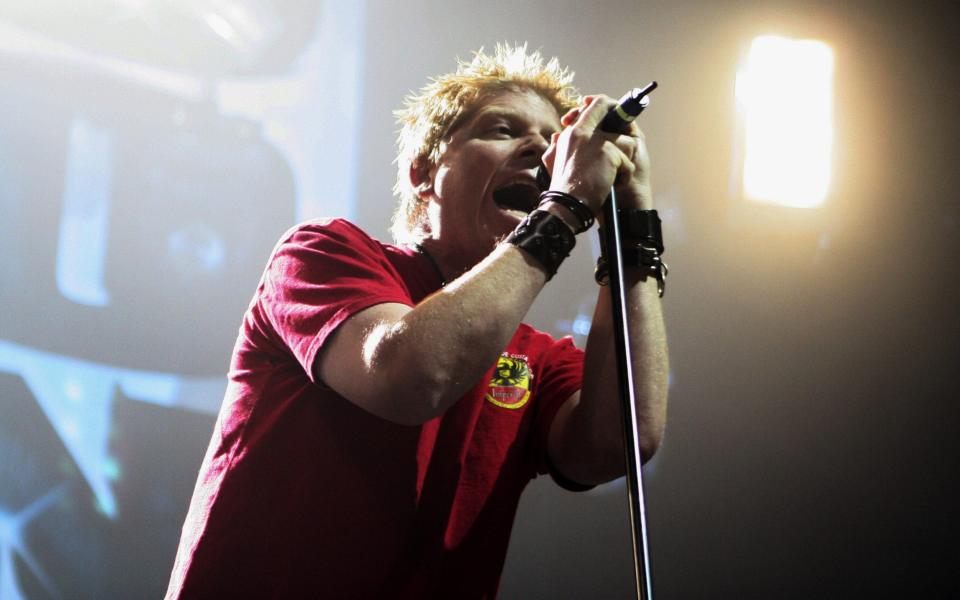
It’s long been something of a sport to question The Offspring’s credibility. America’s most feloniously underrated band, inattentive listeners are quick to mistake the group’s quirkier songs for novelty hits. Punk purists balk at the popularity of it all. Stuff and nonsense, of course, but in a just world their contribution to the cause would be better recognised. As well as much else, at this stage in their respective careers they are a good deal better than Green Day. The band with whom they will forever be conjoined, these days The Offspring follow a truer, and more convincing, path.
“We all came from an era when punk rock was less of fad,” Holland says. “It was something you were really into. When you’re a biker, you’re a biker for life, right? But if you’re a hair metal guy, you might be a DJ after that. Punk rockers are like bikers.”
Or pilots. As it so happens, flying poorly patients hundreds of miles to hospital isn’t the only act of kindness on Dexter Holland’s CV. In 2000, prior to the release of the Conspiracy Of One album The Offspring gave a million dollars of their own cash to a competition winner. Speaking to ABC News, the singer said that “it’s kind of an exciting, outrageous way to announce that our record’s coming out. But I like the fact that it doesn’t try to soak the [audience] for every last dollar… all our money has come from our fans; we thought it would be a nice gesture to give some of it back.”
The winning entrant was a 14-year old from Winder, in Georgia. Presented with 10,000 $100 bills, Ashley Hitchcock said she planned to use the money to clear her father’s debts, and to buy him a house and a car. “It’s overwhelming,” she said, “I can’t believe I won.”
“She got a million dollars from us,” remembers Noodles. “To which she said, ‘The Offspring are okay, but I really like Slipknot.’”
Let the Bad Times Roll by The Offspring is on release now. The band tour the UK with The Hives in November

